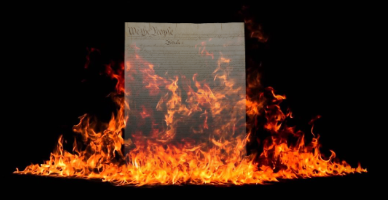
The panel of the 9th Circuit that’s dealing with the illegal takeover of the California National Guard whiffed it yesterday.
In two very significant ways.
First, and probably most significantly, they held that Trump is “likely to prevail” on the issue of whether his declaring an imaginary emergency was enough to make his takeover of the guard legal.
This is absurd, as lawyers like to say, on its face.
Any even sane-adjacent person reading those laws (we all went and read the actual laws involved, right?) and being even vaguely aware of the actual situation in Los Angeles (we have all been keeping up with actual news from L.A., right?) would immediately come to the conclusion that no emergency requiring federal control of the California guard as described in those laws actually exists. Or ever did.
But in order to keep Judge Breyer’s sensible order from taking effect, the 9th Circuit panel needed to find that Trump was likely to succeed, so find they did.
So that’s quite bad.
The panel’s other swing-and-a-miss yesterday was to consider that the appropriate situation to leave things in while the case is litigated is with Trump in control of a federalized state National Guard deployed in the state’s largest city.
Now, courts should be attempting to achieve minimal disruption and maximal flexibility while a case is litigated; they need to not cause problems that are unlikely to be solvable when deciding what state to pause things in while litigation drags itself to the finish line. The legal term there is “irreparable harm”.
They shouldn’t let irreparable harms happen while the process works out.
So the panel thinks that it causes less irreparable harm to have state troops, under federal command and armed with live ammunition, occupying L.A. than it would to … not have that?
The panel has clearly not been reading the real news.
So that’s pretty bad too.
Those of us from the West are used to the idea that, though it’s a much more difficult process than it should be, the citizens can at least get rid of a judge who makes bad decisions (or maybe just made one very bad decision).
It’s called “recall”, for anyone reading this from the East.
But the federal constitution was written long before we came up with that innovation, and it’s impossible to update without the approval of those already empowered by it, so judicial recall doesn’t exist at the federal level. Federal judges operate under an older system, where they’re appointed for life and can pretty much do whatever they like as long as they don’t step too hard on Congress’ toes.
And that’s very bad.
In the short term, there’s nothing we as citizens are allowed to do under this system other than to encourage our National Guard members to take the responsibility on themselves to ignore their unconstitutional orders. This is a hopeful, but unlikely, strategy. Frankly, it has never worked before.
There’s a reason, after all, that even in the U.S. the military primarily focuses on training troops for obedience.
In the longer term, we need to remember that judges (as a class, but not necessarily as individuals) will naturally align themselves with power so we need to look for ways to deal that problem.
Establishing judicial recall at all levels of the courts would be a good start.
- Bad Politics: Welcome To The Jungle Primary - 2026-02-16
- AIpocalypse: Generative AI Cannot Be Reliable - 2026-02-13
- C’mon Democrats: Zero Votes For Fascism - 2026-02-11
